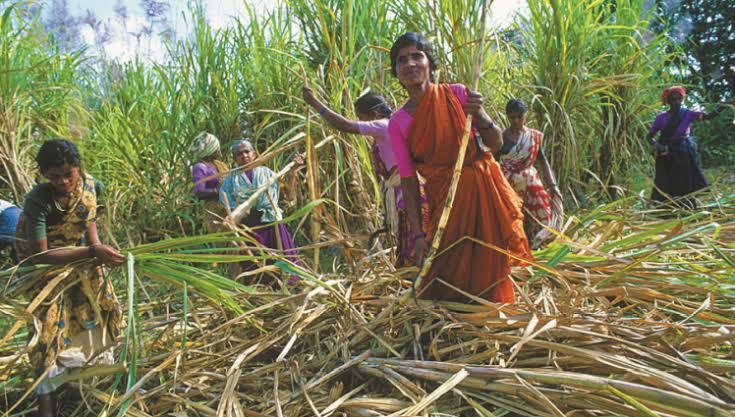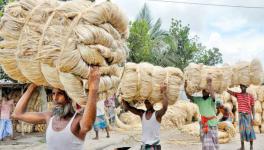Maharashtra Govt Asks Sugar Factories to Transport 1,31,000 Migrant Workers Back Home

File Photo
New Delhi: Conceding the demands raised by the Sugarcane Cutters and Transport Workers Union, affiliated to the Centre of Indian Trade Unions (CITU), the Maharashtra government has ordered sugar factories to make arrangements to transport the sugarcane cutters, stranded in the lockdown, back to their villages, after medical examination.
The order, issued on April 17 by the state government’s disaster management department, instructed all sugar factories in Maharashtra to prepare a list of workers employed and the villages they hail from, and submit them to their respective district magistrates (DMs).
Factories are directed to have medical examinations conducted to check for symptoms of pneumonia, cough and fever, in the absence of which, travel arrangements are to be made for their return.
While the DMs have been instructed to initiate the process, the factories are required to bear the costs of their transport, and the food and water required during the journey. In order to facilitate the passage of their vehicles through the curfewed streets, factories have also been directed to intimate the police and the local authorities of the districts they will be passing through, in advance.
The order also directs the village sarpanchs (heads) to permit these workers to enter their villages, and to make an official note recording their entry. Factories will have to take the receiving report from these sarpanchs and submit the same to the DMs, confirming to authorities that these workers have reached back to their villages.
D. L. Karad - President of Sugarcane Cutters and Transport Workers Union, and vice-president of the Maharashtra branch of CITU, had earlier warned the state government that without ensuring speedy return home of the workers, their families run the risk of losing harvests.
This is because a majority of these workers are also part-time farmers, owning small plots back in their villages, farmed mostly through family labour. In the lean season, for four to six months a year, usually between October and March, they are employed through contractors by sugar factories to cut sugarcane in nearby farms and load them onto trucks which carry them to factories for processing. In time for harvest, they usually return to their villages in the last week of March or early April..
However, due to the lockdown imposed since March 24, 131,000 of these workers have been unable to return. They remain stranded, mostly in informal settlements of makeshift camps around the sugar factories or on nearby farms, hundreds of kilometres away from their native villages, without pay, and without sufficient supply of food and rations.
Many others who attempted to make the trip back through their own travel arrangements have been stopped en route by the police, and placed under quarantine in schools and other such public buildings that are not in use during the lockdown.
One of them is 21 year old Ravi, who is currently sharing a room with five other people who are also placed on quarantine at school outside the city of Beed in central Maharashtra. There are ten such rooms, each shared by six people. Between them, there are only three bathrooms.
“We have to wake up at four in the morning to line up in queue to get a chance to use them”, he told Newsclick. Despite being placed on quarantine and advised physical distancing, crowding outside the washrooms becomes inevitable here.
Ravi said has been there for over two weeks starting from April 3, when a police vehicle intercepted the tempo traveller in which he and tens of other workers from his village, Majalgaon in Beed district, were headed back home.
They had already travelled almost 300 kilometres from Walwa district, where they were employed by Dr. Nagnath Naikwadi Sugar Factory, which is a well-known co-operative factory established in 1981. Paid Rs.230 per tonne of sugarcane cut from nearby fields and loaded onto the trucks transporting them to the factory, Ravi had earned Rs. 20,000 last month.
While the factory was continuing to operate in the beginning of this month despite the lockdown, he said most people were not provided with masks and sanitisers. Afraid of contracting the virus, he and others from Majalgaon village decided to head back home, and boarded a tempo traveller on the evening of April 2.
After a 12-hour long journey, early next morning, only 70 kilometres short of reaching home, they were stopped by the police and placed on quarantine in a nearby school premises. Sufficient food has not been provided to them, he complained.
Breakfast arrives at eight in the morning, but not every day. There is no consistency in the quantity of food provided for lunch, which, on many days, is their first meal of the day. “Very often, the parcels are too small to be filling”, he said.
Ravi is not sure who is supplying them with food. He suspects they may not be from the government. “They’re some sort of social activists or NGO people, I think. They say this is their contribution to us, and have pictures of themselves clicked while distributing food.”
He is hoping that this ordeal will end in a couple of days, since the government’s order also instructs those in charge of such quarantine centres to arrange for the return of sugarcane cutters.
But this order by the Maharashtra government brings no relief to 26-year old Santosh Rathod, who is also hoping to join his family in the Majalgaon village. He is stranded on a farm in Ariyalur district of Tamil Nadu, along with 500 to 600 other sugarcane cutters from Maharashtra.
All of them had been cutting sugarcane in the same farm for Kothari Sugar Factory, located over 40 kilometres away in Kattur village of Thiruvallur district. On March 26, all of them finished their season’s work for the factory, and were set to head back home.
However, left with no transport to cover the more than 1,000 kilometres home, they have been forced to shelter in makeshift tents erected using tarpaulin sheets provided by the factory.
Despite having carried many kilograms of food grains from his native village, the rations provided by the factory to these stranded workers is scarce, leaving only a small portion of meals for each worker, Rathod said.
“Can you communicate a request to the Tamil Nadu government on my behalf?”, he asked. “I want to request them to make arrangements to transport us to Maharashtra. We have sowed sugarcane, wheat and some vegetables which need to be harvested now. But both my brother and I are here, and my parents are too old and weak to harvest by themselves.”
He fears all the labour in cultivating these crops will go waste if he doesn’t make it back soon to harvest on time.
Once the order is implemented in Maharashtra, Karad said, he would reach out to unionists in Tamil Nadu CITU for help to get these workers back home.
Get the latest reports & analysis with people's perspective on Protests, movements & deep analytical videos, discussions of the current affairs in your Telegram app. Subscribe to NewsClick's Telegram channel & get Real-Time updates on stories, as they get published on our website.
























